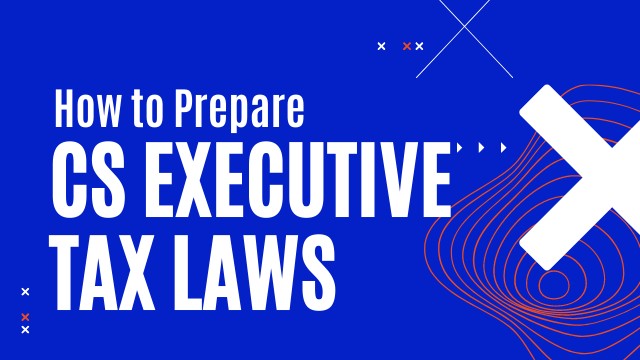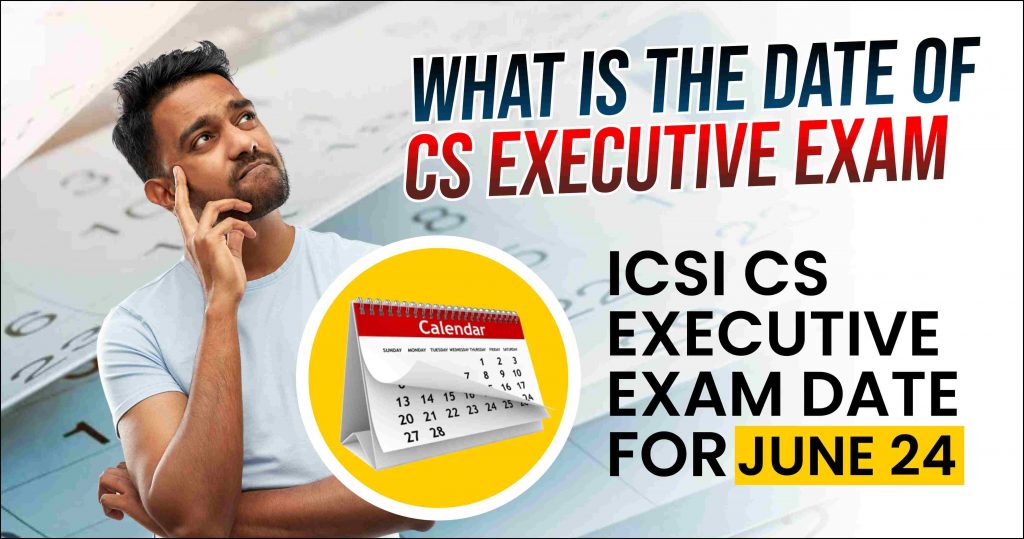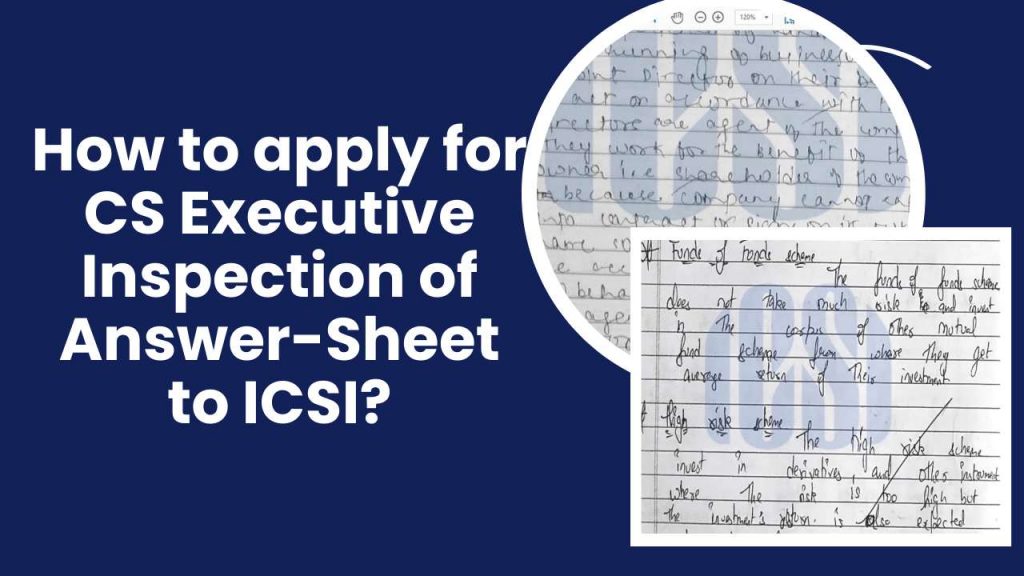As we all know that the subject of Taxation itself is very complicated by its own nature and a lot of provisions involved. The complications further enhance due to its continuous refinement, amendments and changes which are very often brought by the various regulations.
These regulations are released by the Government, sometimes to boost the economy, increase the revenue, lowering the taxation burden at the consumer end etc. But all these complications still don’t make this subject unimportant or inevitable from a learning perspective.
Considering all the importance which this subject holds for any professional student, this subject becomes one of the most important subject of CS Executive examination. It is the fourth subject of the Module 1 of CS Executive. As we know that CS Executive is the second stage of the professional course of Company Secretary. The executive stage is basically designed to inculcate skills and competence of executive program passed students.
The reason for inclusion of this important subject in the curriculum is to impart conceptual understanding to the students regarding provisions of Direct Taxes and Indirect Taxes.
An outline of Company Secretary Courses and Specialisation- Executive Programme Papers
There are 8 papers divided into 2 Modules in CS Executive Programme (wef. 01.03.2018)
| MODULE 1 (4papers) | MODULE 2 (4 papers) |
1. Jurisprudence, Interpretation & General Laws 2. Company Law 3. Setting Up Of Business Entities And Closure 4. Tax Laws | 5. Corporate & Management Accounting 6.Securities Laws & Capital Markets 7.Economic, Business And Commercial Laws 8. Financial And Strategic Management |
An Overview of the subject
The subject is divided into two parts i.e. Direct Taxes and Indirect Taxes. Part I of the subject deals with Direct Taxes and Part II deals with Indirect Taxes.
The Institute has decided to change the format of this exam from descriptive to OMR, Optical Mark Recognition Format. In this case, students are required to answer multiple choice questions on OMR Sheets by darkening the appropriate choice. One mark is awarded for each correct answer. There is no negative marking in this subject.
ICSI CS Executive New Syllabus Study Material : Module 1
| Paper | Coverage |
|---|---|
| Tax Laws | To provide working knowledge on practical application of Direct Tax Laws and To provide conceptual knowledge of GST with practical application of GST Laws |
CS Executive Examination Syllabus of this subject
Before planning the study curriculum, first of all we should know the contents of the subject. Following is the arrangement Of Study Lessons in this subject
| Study Lessons Part 1 – Direct Taxes |
| 1. Direct Taxes at a Glance 2. Basic concepts of Income Tax 3. Incomes which do not form part of Total Income 4. Computation of Income under Various Heads 5. Clubbing provisions and Set Off and / or Carry Forward of Losses 6. Deductions from Gross Total Income & Rebate and Relief 7. Computation of Total Income and Tax Liability of various entities 8. Classification and Tax Incidence on Companies 9. Procedural Compliance 10. Assessment, Appeals & Revision |
| Study Lessons Part 1I – InDirect Taxes |
| 11. Concept of Indirect Taxes at a glance 12. Basics of Goods and Services Tax ‘GST’ 13. Concept of Time, Value & Place of Taxable Supply 14. Input Tax Credit & Computation of GST Liability- Overview 15. Procedural Compliance under GST 16. Basic overview on Integrated Goods and Service Tax (IGST), Union Territory Goods and Service tax (UTGST), and GST Compensation to States 17. Overview of Customs Act |
Objective of introducing this subject in CS Executive course
In the present time, taxation is not just a means of transferring money to the government to spend it for meeting the public expenditures or raise revenue to the government, but taxes have become beside that, as a tool for redistribution of income and wealth in society. It also serves as a means of economic development and plays a significant role in stabilization of income. Taxation assists in finding solutions to the economic problems which are faced by a country, like unemployment, inflation, and depression. Countries practice sovereignty authority upon its citizens, through levying of Taxes.
The reason for inclusion of this important subject in the curriculum is to impart conceptual understanding to the students regarding provisions of Direct Taxes and Indirect Taxes.
- To provide working knowledge on practical application of Direct Tax Laws and
- To provide conceptual knowledge of GST with practical application of GST Laws
Strategy for Preparation
- Understanding the requirements of the subject-First of all the students should understand the requirement of the paper and subject thoroughly.
- Dynamic subject-At the same time the student needs to remember that it is not a static subject like accounts or costing rather it involves a lot of dynamic elements because the provision keeps on changing from time to time. Every time Finance Act is released by the Government in the month of Feb which brings a lot of changes in the existing provisions.
- Refer recent case laws-While preparing the examination, the student is required to refer relevant and important recent examples from current affairs happening in and around business.
- Solving Practice-A lot of practice is required for attempting and clearing this paper as this paper. It is recommended that a student should practice as many problems as its possible.
- Regular Updation- Update yourself about all the relevant circulars, clarifications, notifications, etc. issued by the CBDT, CBEC & Central Government, on or before six months prior to the date of the respective examinations.
Fundamental topics of subject-Last but not the least, the students need to be aware of the fundamentals and key provisions, amendments to the Acts, Powers, features, and functions of the provisions of the acts, especially before the examination.
Now we will make a framework for studying and preparing this subject, chapter wise.
| Chapter | Important topics to be covered |
|---|---|
| Chapter 1 DIRECT TAXES – AT A GLANCE | Taxes – An Introduction Characteristics of Taxes Canons of Taxes Objectives of Taxation Direct Vs Indirect Taxes Background of Taxation System in India Tax Structure in India Administration Vital Statistics and Layout |
| Chapter 2 Basic Concepts of Income Tax] | Overview of Finance Bill Some basic concepts like assessment year, previous year, income, person, assessee, Distinguish between capital and revenue receipts etc. Basic steps in the calculation of tax liability. Be able to determine the residential status of a person Be aware of the importance of residential status for tax purposes The scope of total income The rates of tax |
| Chapter 3 [Incomes which do not form Part of Total Income | Background Incomes which do not Form Part of Total Income |
| Chapter 4 COMPUTATION OF INCOME UNDER VARIOUS HEADS PART I – INCOME UNDER THE HEAD “SALARIES” | Basis of Charge Salary [Section 17(1)] Allowances Retirement Benefits Profits in lieu of Salary Provident Funds – Treatment of Contributions to and Money Received From the Provident Fund Deductions from Salary Computation of Salary |
| Chapter 4 COMPUTATION OF INCOME UNDER VARIOUS HEADS PART II – INCOME UNDER THE HEAD HOUSE PROPERTY | Basis of Charge [Section 22] Determination of Annual Value Deductions from Net Annual Value (Section 24) Deemed Ownership House Property Incomes – Exempted From Tax |
| Chapter 4 COMPUTATION OF INCOME UNDER VARIOUS HEADS PART III – PROFIT AND GAINS FROM BUSINESS / PROFESSION | Business’ or ‘Profession’ Income Chargeable To Tax under the Head Business or Profession (Section 28) Speculation Business Computation of Profits of Business or Profession Computation of Income under the Head “Profits and Gains from Business or Profession” Admissible Deductions Expenses Disallowed (Section 40) Expenses Restricted Deemed Profits Special Provision In Case of Income of Public Financial Institutions, Etc. (Section 43D) Special Provisions Related To Insurance Business (Section 44) Compulsory Maintenance of Books of Account (Section 44AA) Compulsory Audit of Books of Account (Section 44AB) Special Provision for Computing Profits and Gains of Business on Presumptive Basis (Section 44AD) Presumptive Taxation for Professionals [Section 44ADA] Special Provisions for Computing Profits and Gains of Business of Plying, Hiring or Leasing Goods Carriages [Section 44AE] |
| Chapter 4 COMPUTATION OF INCOME UNDER VARIOUS HEADS PART IV – INCOME FROM CAPITAL GAINS | Capital Gains Capital Asset [Section 2(14)] Short-Term & Long-Term Assets Transfer [Section 2(47)] Mode of Computation Ascertainment of Cost in specified circumstances [Section 49] Advance Money Received [Section 51] Exemption of Capital Gains |
| Chapter 4 COMPUTATION OF INCOME UNDER VARIOUS HEADS PART V – INCOME FROM OTHER SOURCES | Basis of Charge of Income from Other Sources [Section-56] Casual Income [Section 56(2)(Ib)] Income from Family Pension Taxation of Dividends Deductions Allowable In Computing Income from Other Sources Amounts Not Deductible [Section 58] Deemed Income [Section 59] |
| Chapter 5 CLUBBING PROVISIONS AND SET OFF AND / OR CARRY FORWARD OF LOSSES | Transfer of Income [Section 60] Revocable Transfer of Assets [Section 61] Income of Spouse Income From Assets Transferred To Son’s Wife [Section 64(1)(vi)] Transfer For Immediate Or Deferred Benefit Of Son’s Wife [Section 64(1)(viii)] Income to Spouse Through A Third Person [Section 64(1)(vii)] Clubbing of Income of Minor Child [Section 64(1A)] Income from the Converted Property [Section 64(2)] Recovery of Tax Set-Off and Carry-Forward of Losses Carry-Forward of Losses Carry Forward and Set-Off Of Accumulated Business Loss and Unabsorbed Depreciation Certain Cases of Amalgamation or Demerger Etc. [Section 72A] Carry Forward and Set Off Of Accumulated Loss and Unabsorbed Depreciation Allowance in Scheme of Amalgamation of Banking Company in Certain Cases [Section 72AA] Treatment of Carry-Forward of Losses of Certain Assessees Submission of Return for Loss [Section 80] Summary of provisions regarding carry forward and set-off of losses |
| Chapter 6 DEDUCTIONS FROM GROSS TOTAL INCOME, REBATE AND RELIEF | Deductions Illustration Relief and Rebate |
| Chapter 7 COMPUTATION OF TOTAL INCOME AND TAX LIABILITY OF VARIOUS ENTITIES | Taxation of Individuals Taxation of Hindu Undivided Families Computation of Income of HUF Taxation of Firms Alternate Minimum Tax (AMT) [Section 115JC] Taxation of Association of Persons /Body of Individuals Taxation of Co-Operative Societies Tax Exemptions to Political Parties (Section 13A) Electoral Trust Tax Exemptions for Charitable Trusts and Institutions |
| Chapter 8 CLASSIFICATION AND TAX INCIDENCE ON COMPANIES | Background & Types of Companies Tax Incidence under Income Tax Act, 1961 419 Minimum Alternate Tax (MAT) Mat Credit [Section 115JAA] Dividend Distribution Tax [Section 115-O] 437 Carbon Credit [Section 115BG] Buy-Back of Shares Conversion of an Indian Branch of a Foreign Company into an Indian Subsidiary Company Tax on Income Distributed by Specified Company or Mutual Fund Equalization Levy Taxation Aspects Related To Conversion of Company into an LLP Tax Liability of Companies in the Event of Liquidation Taxation of Share Premium Taxation Aspects of Amalgamations, Mergers and Demergers |
| Chapter 9 PROCEDURAL COMPLIANCE | Permanent Account Number [Section 139A] 458 Tax Deduction Account Number (TAN) Tax Deducted At Source (TDS) 463 Tax Collection At Source (TCS) [Section 206C] Time limit for the payment of TDS to the Government TDS Forms TDS Chart FY 2019-20 “AY 2020-21” Minimum Threshold Limit Upton Which TDS not Applicable Advance Payment of Tax Self-Assessment Tax (SAT) Returns Signing of Return [Section 140] Fee and Interest Collection and Recovery of Tax Refunds (Section 237 to Section 245) |
| Chapter 10 ASSESSMENT, APPEALS & REVISION | Income-Tax Authorities (Appointment, Jurisdiction and Powers) [Section 116] The Central Board of Direct Taxes (CBDT) Commissioner of Income-Tax (Appeals) Assessment Appeal Introduction Appeals Orders before Commissioner (Appeals) Procedure for Filing of Appeal [Section 249(1)] Period of Limitation to Prefer an Appeal [Section 249(2)] Payment of Tax before Filing Appeal [Section 249(4)] Procedure in Appeal [Section 250] Powers of the Commissioner (Appeals) [Section 251] Revisions Revision by the Commissioner of Income Tax [Sections 263 And 264] Revision of orders prejudicial to the interest of Revenue [Section 263] Revision of order in the interest of Assessee [Section 264] Circumstances in Which No Revision can be Made [Section 264(4)] Appellate Tribunal [Section 252] Appealable Orders [Section 253(1) AND (2)] Procedure For Filing Appeal [Section 253(3), (4)&(6)] Order of Appellate Tribunal [SECTION 254] Procedure of Appellate Tribunal [SECTION 255] Appeal to High Court Appeal to the Supreme Court [Section 261] Offences and Penalties Offences and Prosecution |
| Chapter 11 CONCEPT OF INDIRECT TAXES AT A GLANCE | Background Constitutional Powers of Taxation Constitution Amendment Act, 2016 Goods and Services Tax Council Compensation to States for deficit in Tax collections Power to Remove Difficulties Indirect Taxes in India – An Overview Pre GST Tax Structure & Deficiencies Administration of Indirect Taxation in India Administrative Mechanism at the Central Level Existing Tax Structure |
| Chapter 12 BASICS OF GOODS AND SERVICES TAX | Constitutional Framework of Goods & Services Tax Taxable Event Concept of Supply Levy & Collection of Tax Composition Scheme Liability to pay GST Exemptions Under Goods & Services Tax |
| Chapter 13 CONCEPT OF TIME, VALUE AND PLACE OF TAXABLE SUPPLY | Concept of Supply Place of Supply Time of Supply Value of Taxable Supply [Section 15 of CGST Act, 2017] Valuation Rules : Chapter IV, CGST Rules, 2017 |
| Chapter 14 INPUT TAX CREDIT AND COMPUTATION OF GST LIABILITY | Input Tax Credit Goods Sent To Job Worker Input Service Distributor |
| Chapter 15 PROCEDURAL COMPLIANCE UNDER GST | Registration Tax Invoices, Debit & Credit Notes Rules for Tax Invoices, Debit & Credit Notes Accounts and Records Electronic Way Bills Returns Payments Payment Rules [Chapter IX] Refunds Audit |
| Chapter 16 BASIC OVERVIEW ON IGST, UTGST AND GST COMPENSATION TO STATES ACT | Applicability of the UTGST ACT, 2017 Administration & Powers of Officers [Section 4, 5 & 6] Levy and Collection of UTGST [Section 7] Exemption From GST [Section 8] Payment of Tax [Section 9] Input Tax Credit on Input Stocks [Section 18] Input Tax Credit: Taxable as well as Exempted Goods Switch Over from Composition Levy Advance Ruling [Section 14 of UTGST Act, 2017] Constitution of Authority for Advance Ruling [Section 15] Constitution of Appellate Authority For Advance Ruling [Section 16] |
| Chapter 17 OVERVIEW OF CUSTOMS LAW | Levy & Collection of Customs Duties Types of Customs Duties Classification & Valuation of Import And Export Goods Exemptions Officers of Customs Law Administration of Customs Law 758 Import & Export Procedures under Customs Law Transportation & Warehousing Duty Drawback Demand & Recovery Confiscation of Goods & Conveyances Refund |
Before reading further check out these posts:

CA Saumil Manglani
CS Executive Tax Law by Unique Academy For Commerce
Study Plan
1. Ensure complete understanding of the CS Study Material
2. Practice of solving numerical problems
3. Start with a proper Time Table
4. Setting targets
5. Analysing the actual performance every week
6. Never Do following-
- Never go with selective topics
- Never refer old study material
- Try to finish your revision beforehand
The study material released by ICSI is enough for CS Executive Exam preparation. Still students can refer to the following books for preparation of CS Executive Exam which can help them in proper update and practice. These books have been taken as a reference from ICSI also.
Part A Direct Taxes
1. Mahendra B. Gabhawala: Direct Tax Ready Reckoner with Tax Planning
2. Bharat’s Law House : Income Tax Act
3. Bharat’s Law House : Income Tax Rules
4. Taxmann’s : Income Tax Act
5. Taxmann’s : Income Tax Rules
6. Dr. Vinod K. Singhania : Direct Taxes Law and Practice & Dr. Kapil Singhania
7. Dr. Girish Ahuja & : Direct Taxes Ready Reckoner with Tax Planning Dr. Ravi Gupta
Part B In-Direct Taxes
1. Dr. Sanjiv Agarwal : Goods & Services Tax, Laws, Concepts and Impact Analysis, Bloomsbury & Sanjeev Malhotra
2. V.S. Datey : GST Ready Reckoner, Taxmann
3. Dr. Sanjiv Agarwal : A Complete Guide to Goods & Services Tax Ready Reckoner in Q & A & Sanjeev Malhotra Format, Bloomsbury
4. Dr. Yogendra Bangur : Comprehensive Guide to Tax Laws, Aadhya Prakashan
5. Dr. Sanjiv Agarwal : Compendium of Judicial Pronouncements, Bloomsbury & Sanjeev Malhotra
6. R.K. Jain : Customs Law Manual, Centax


















